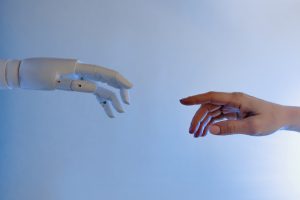
AI writers, Voice assistants, speech-to-text, technology are taking on more and more responsibility and scale in our daily lives. Therefore, I wonder to what extent it can assist content creators or even replace them.
New technologies (tools and robots) can respond to our requests effectively, translate and talk properly. Will artificial intelligence be able to produce content on its own very soon? Are robot writers coming soon? This is what we have chosen to highlight here.
Writing and Artificial Intelligence
First of all, we must understand that artificial intelligence is developing and applying to many areas, especially writing.
Artificial intelligence was defined by Marvin Lee Minsky as “the construction of computer programs that engage in tasks that are, currently, performed more satisfactorily by human beings, because they require high-level mental processes such as perceptual learning, memory organization, and critical reasoning.”
This already means, that by his definition, Marvin Lee Minsky knew that there were already limits to these computer programs. However, this definition is relatively old. Advances in technology were not what they are today.
What is complex is that artificial intelligence is a broad field that includes computer science, mathematics, neuroscience, and even philosophy.
AI itself relies on algorithms. An algorithm is a finite and unambiguous sequence of operations or instructions for solving certain problems. Algorithms, these artificial neurons, made up of powerful servers, allow to process many sources of information, to make heavy calculations.
Today, artificial intelligence is very present in our daily life with personal assistants, deep learning, etc. These programs in full development memorize our human behaviors to then offer us the most relevant information.
Writing is an ART
Writing is characterized as a representation of speech and thought by conventional graphic signs. A system of graphic signs that notes the message to then keep it and share it.
That is to say, it was necessary to put in place this system of signs, for conservation and transmission. It is a mode of expression of thought, of communication.
So, what is the link between AI, writing, and robots?
 Will robots and AI replace writers, writing professionals?
Will robots and AI replace writers, writing professionals?
Deep learning, machine learning, and artificial intelligence continue to develop, allowing web content generators to rewrite sentences, paragraphs, articles, and all kinds of content independently.
Is the future of writing by artificial intelligence inscribed by the emergence of robot writers soon?
In fact, despite what some specialists have been advancing for several years, the robots, the artificial intelligence used are still very far from being real writers, authors.
Unlike humans, AI is programmed. And although it will always continue to learn, it will be limited to a certain extent to what is instilled in it. And especially robots do not have emotions. They do not have creativity, style, remain factual, have no capacity for judgment.
They are useful for texts that have little “added value”. For example, economic results, sports, weather, or some real estate ads.
Automatic Writing Replaces Writers with Software
Robot writers coming soon? Because it must also be said, the progress of new writing technologies is considerable. For example, automatic writing reduces some entities in journalism, publishing, and e-commerce.
Today, writing by AI is advancing. Indeed, the giant Microsoft has decided to replace dozens of journalists with algorithms. For its part, OpenAI – Alon Musk’s start-up- is not to be outdone!
Its artificial intelligence GPT – 3 knows how to finish user sentences.
In September 2002, the British newspaper The Guardian published an editorial signed by GPT – 3 with the words ” A robot wrote this whole article. Are you scared yet, human“?
This humorous example was intended to demonstrate that humans have nothing to fear from robots, despite their ability to write a coherent text in its integrity. Because yes robots are faster, but quality writing is not judged by this. Algorithms allow an acceleration of the work of a writer, a journalist, a professional in writing for complex texts.
Conclusion
Tools tend to help writers not replace them. Writing is emotional and subjective. Algorithms remain collectors, re -” formulators ” of information. They do not know how to make writings attractive. So yes, some articles, types of writing are factual, neutral, present information. However, others – for example blog posts-need perspective, originality, subjective, conscience and human experience.





